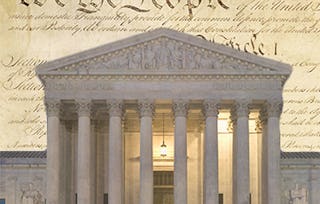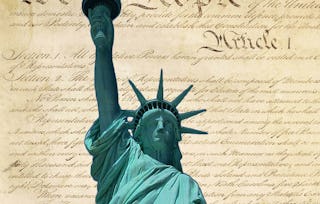This course offers an introduction to the U.S. Constitution and landmark Supreme Court cases interpreting it. It explores the Constitution’s origins, its amendment over the years, and methods of constitutional interpretation. Topics include the nature and structure of the federal government, the powers of the federal government, and individual rights.

Introduction to Key Constitutional Concepts and Supreme Court Cases

Introduction to Key Constitutional Concepts and Supreme Court Cases

Instructor: Professor Kermit Roosevelt, III
42,897 already enrolled
Included with
1,327 reviews
Skills you'll gain
- Diversity Equity and Inclusion Initiatives
- Civil Procedures
- Civil Law
- Social Studies
- Case Law
- Social Justice
- Governance
- Court Systems
- Political Sciences
- Legal Proceedings
- Case Studies
- Legal Research
- Skills section collapsed. Showing 11 of 12 skills.
Details to know

Add to your LinkedIn profile
4 assignments
See how employees at top companies are mastering in-demand skills

There are 4 modules in this course
Classes 1, 2, and 3 discuss why we need a Constitution and the history that preceded its drafting. You will learn about the two conflicting lessons the founders learned from the Revolution and the failure of the Articles of Confederation: the national government can become a tyrant if it is too strong, but the nation will fall apart if it is too weak. These lectures explore how the drafters sought to balance these concerns in the original Constitution and the many compromises it contains. You will also learn about two approaches to interpreting the Constitution: Originalism and Living Constitutionalism. Classes 4, 5, and 6 explore the powers of the legislative, executive, and judicial branches of government and the separation of powers between those branches. The Framers gave the federal government limited powers, and divided those powers among the three branches in order to protect individual liberty and state authority.
What's included
6 videos1 assignment
This segment first explores constitutional amendments, including the Bill of Rights, and the Reconstruction and Progressive-era Amendments. Then, we will take a detailed look at one of the most important amendments: the First. We will learn about the constitutional protections for speech and religion, how they have changed over time, and how they apply to various circumstances. Finally, we will learn about the Establishment Clause and what it means in today's society.
What's included
6 videos1 assignment
We begin here by looking at another group of very important constitutional provisions: the Fourth, Fifth, and Sixth Amendments, which guarantee rights to individuals accused of committing crimes. These amendments protect us against unreasonable searches, ensure our right to remain silent in the face of police questioning, and allow us to demand the assistance of counsel and trial by jury. These rights are fundamental to our system of criminal justice. Then we will shift our focus to examining the Second Amendment, the right to bear arms, and incorporation. We will also discuss the Ninth and Tenth Amendments, unenumerated rights, and states' rights, and finish by considering the implications of the Civil War and Reconstruction for the balance of power between the federal government and the states.
What's included
6 videos1 assignment
The first three lessons consider the equal protection and due process clauses of the 14th Amendment. We will begin by discussing race discrimination and the anti-classification and anti-subordination perspectives on equal protection. Next, we will discuss sex discrimination and the right to an abortion derived from the due process clause. Finally, we will examine discrimination based on sexual orientation, and the social progression of major civil rights movements in the United States. The final three lessons in this module consider some modern constitutional controversies. First, we will learn about presidential war powers. Next, we will analyze free speech in the context of campaign finance reform. Finally, we will discuss federal legislative power with a focus on health care reform.
What's included
6 videos1 assignment
Instructor

Offered by
Explore more from Governance and Society
 Status: Preview
Status: PreviewUniversity of California, Irvine
 Status: Preview
Status: PreviewYale University
 Status: Preview
Status: PreviewYale University
 Status: Preview
Status: PreviewUniversity of California, Irvine
Why people choose Coursera for their career

Felipe M.

Jennifer J.

Larry W.

Chaitanya A.
Learner reviews
- 5 stars
87.33%
- 4 stars
11%
- 3 stars
1.05%
- 2 stars
0.22%
- 1 star
0.37%
Showing 3 of 1327
Reviewed on Aug 31, 2019
The entire course was very thoroughly presented and has been really helpful and informative in enhancing my knowledge about the American legal system. Kudos to UPenn and Coursera!
Reviewed on Jul 21, 2017
Professor does a great job and in explaining the complexities. He does not take any partisan stand and does a great job and giving prominence to all sides of the argument. Enjoyed the course throughly
Reviewed on Dec 10, 2016
This is a great introductory or refresher course. Everything is put forth in an easy-to-understand concept. It was beneficial to me to compare key cases and how society affected them. Thank you.

Open new doors with Coursera Plus
Unlimited access to 10,000+ world-class courses, hands-on projects, and job-ready certificate programs - all included in your subscription
Advance your career with an online degree
Earn a degree from world-class universities - 100% online
Join over 3,400 global companies that choose Coursera for Business
Upskill your employees to excel in the digital economy
Frequently asked questions
To access the course materials, assignments and to earn a Certificate, you will need to purchase the Certificate experience when you enroll in a course. You can try a Free Trial instead, or apply for Financial Aid. The course may offer 'Full Course, No Certificate' instead. This option lets you see all course materials, submit required assessments, and get a final grade. This also means that you will not be able to purchase a Certificate experience.
When you purchase a Certificate you get access to all course materials, including graded assignments. Upon completing the course, your electronic Certificate will be added to your Accomplishments page - from there, you can print your Certificate or add it to your LinkedIn profile.
Yes. In select learning programs, you can apply for financial aid or a scholarship if you can’t afford the enrollment fee. If fin aid or scholarship is available for your learning program selection, you’ll find a link to apply on the description page.
More questions
Financial aid available,

